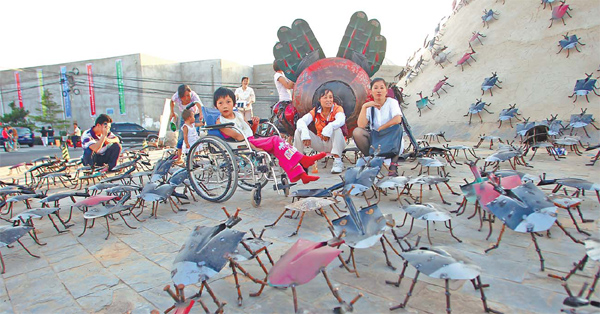Focus
Art festival goes beyond the norm
By Qin Zhongwei (China Daily)
Updated: 2010-09-16 08:02
 |
Large Medium Small |
|
 Exhibitions and a promotional poster at the 6th Songzhuang Culture and Arts Festival. PHOTOS BY ZOU HONG / CHINA DAILY
|
However, in Songzhuang in Beijing - arguably China's largest colony of artists - the smiling face of this 45-year-old laborer is found on numerous promotional posters for the 6th Songzhuang Culture and Arts Festival, running from Sept 10 to Oct 10.
"It's amazing," said Zhang Ruohong, in response to seeing Wang's poster after traveling hundreds of miles to Beijing to receive the top prize of 100,000 yuan from the festival's organizing committee at the opening ceremony.
Zhang and Wang were handed the monetary prize, usually reserved for an artist's important contribution to the scene, on behalf of the "Yongji Fuping Petty Loan" program for their significant roles.
The annual art event is famous for inviting artists and institutions to give exhibitions in the village's 14 art museums and other studios. This year, however, the festival launched a new theme called Crossover, which aimed to widen the scope of thought to include other people of significance besides artists.
The small loan program, referred to as a Chinese version of the 2006 Nobel Peace Prize winner Muhammad Yunus' micro-loan project, aims to help farmers buy supplies, start small businesses and offer financial support with a maximum loan of 20,000 yuan.
Wang and Zhang, who swapped their jobs as farmers to become loan officers last year for rural areas in Shanxi province, are responsible for deciding who can get access to these loans.
By traveling to various villages, the pair talks with neighbors and relatives of applicants to judge their personal relationships and decide whether they are qualified to receive a loan - morality is considered a key asset in the program.
One year after the loan project was launched, it has been considered a success for the farmers involved and also for Wang and Zhang.
"Their dedication inspired us because society is mostly devoid of honesty, trust and responsibility," said Yue Luping, chief organizer of the festival. "This is also what we also try to pursue in art."
Yue added that the festival is trying to shake off a public notion that the art world focuses too much on the negative aspects of life.
"Art should not be isolated as society moves forward," he said.
Wang Jiuliang, an energetic freelance photographer who presented his exhibition Trash Fortress Besieged - depicting Beijing as surrounded by garbage dumps - also won 50,000 yuan from the organizing committee.
As always, artists, performers and musicians are presenting works at the month-long festival that this year, under the theme of Crossover, promotes attitude of experimentation, according to the organizers. It was no surprise therefore that Han Qiaosheng, a famous sports anchor with China Central Television, hosted the opening ceremony.
Key works at the festival include installments made from cow manure and beer bottles by a Tibetan artist, as well as the construction of a shabby house to reflect the inconvenient truth of China's violent demolitions.
The crossover theme also extends to Songzhuang itself, once a rural spot in Tongzhou district and now home to around 4,000 artists and their studios, including names of mention such as Fang Lijun, Qi Zhilong, and Yue Minjun.
Songzhuang Art Museum, a 5,000-sq-m landmark building, stands proudly as the first museum in China to be built using money raised by farmers.
And as other art communities in Beijing's suburbs such as Caochangdi and Suojiacun wait in fear of being demolished, Songzhuang has plans to turn itself into an area called the Central Art District, according to Hu Jiebao, Party secretary for Songzhuang.
Hu added that Songzhuang will try to maintain a balance between natural beauty and artistic atmosphere.
"There is a lot of fun here and the feeling is unique when compared with 798," said Ulla Bekel, an art lover from Germany.
"It is a very interesting to see these avant-garde exhibitions while at the same time being reminded by the surroundings that you are in the Chinese countryside," she said.
China Daily
(China Daily 09/16/2010 page28)